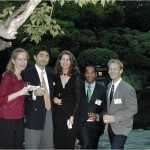 In the wake of Trayvon Martin’s killing, Jonathan Capehart relayed a couple of the “it ain’t right, it ain’t fair, but that’s the way it is” lessons he was taught in youth: don’t run in public, lest someone think you’re suspicious; and, don’t run while carrying anything in your hands, lest someone think you stole something.
In the wake of Trayvon Martin’s killing, Jonathan Capehart relayed a couple of the “it ain’t right, it ain’t fair, but that’s the way it is” lessons he was taught in youth: don’t run in public, lest someone think you’re suspicious; and, don’t run while carrying anything in your hands, lest someone think you stole something.
I’ve followed and admired Mr. Capehart’s clear and powerful writing since we met in the US-Japan Leadership Program. We don’t know each other well, but I happened to have this picture of us onscreen when I came across his Washington Post op-ed and appearance on MSNBC. No, I’m not a stalker. I’d been prepping lecture slides for an upper-division sociology class, using the photo as a representation of “social drinking” as a respectable and sophisticated activity for upwardly mobile young adults.*
And there’s the rub. When a black male is running down the street, we don’t tend to notice his respectability, sophistication, or upward mobility — let alone his youth or innocence. Yet the other four people in the picture can generally run with impunity, donning hoodies if we wish. Even those who resist ideas like “white privilege” can appreciate such simple and basic injustices, especially when writers as talented as Jonathan Capehart help bring them to light.
*As you might guess, I then follow-up with a few pictures portraying alcohol use in a less positive light.

